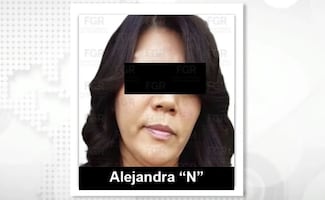Más Información

Confirman que cuerpo localizado junto a la UAEM es de Kimberly Joselin; Fiscalía asegura que no habrá impunidad

"El Mencho" tenía presentes a Los Alegres del Barranco; en cartas le hablaban del grupo musical que cantaba su corrido

Dan 108 años de prisión a Alejandra “Candela” por delitos de secuestro; está ligada al grupo criminal “Los Rojos”

SCJN niega amparo a Walmart para tener 0% de IVA en todos los productos menstruales; argumenta “ventaja indebida en el mercado”
In Argentina , considered the country of cyclic crisis , the latest economic problems are threatening President Mauricio Macri ’s reelection next year, when the inevitable recession will plunge the Gross Domestic Product ( GDP ) to 0% and the inflation rate will reach 25% , according to experts and reports from rating agencies.
In a dramatic message “from the heart” minutes before the foreign exchange market was opened on Monday, the conservative Macri, businessman and former Buenos Aires mayor, announced on television a series of new austerity measures slashing half of its government ministries and increasing the export tax on grains, one of the South American nation’s biggest crops.
“I have to ask you to understand that this in an emergency and we need your support,” Macri said, referring to exporters who will have to pay the additional tax.
Argentina
is one of the biggest producers of corn , wheat , and raw soybeans in the world, and it is the single biggest producer of soy meal and soy oil , two crucial commodities in the rearing of livestock which a decade ago fueled the export boom to Asian markets, yet deepened the Argentinian dependence on raw materials.
On Tuesday, Economy Minister Nicolas Dujovne met International Monetary Fund ( IMF ) chief Christine Lagarde in Washington and said they were working together to improve a standby finance deal agreed with the IMF’s Executive Board in June.
Due to the growing currency woes, Argentina requested USD$30 billion in credit from the IMF in a desperate effort to slow inflation and prevent a run on the country’s banks on May .
As part of the three-year standby agreement, the government has received USD$15 billion and it is due to get an additional USD$3 billion next month.
Unfortunately, the plans announced by Macri and the rescue package, which is worth a maximum of USD$50 billion — the largest credit line in IMF’s history —were not received as hoped in international markets, and the peso slid on the news nearing 40 per dollar.
The peso has collapsed
this year with investors worried about the government’s ability to pay its debts.
It has lost more than 50% of its value against the dollar
, one of many emerging markets currencies that have come under pressure.
Nearly 70% of Argentine government debt is in foreign currencies and the falling peso makes it increasingly hard for the authorities to pay back what it owes.
Pre-recorded message
During his pre-recorded message, Macri blamed the corruption of the former Peronista government led by Cristina Fernández de Kirchner —herself under investigation— the drought , the trade war between the United States , and China , and the lack of unity among Argentinians.
The 59-year-old stressed that the last five months have been the worst in his personal life since he was abducted in 1991 by rogue elements from the federal police, although some analysts warned that the president’s latest measures still fell short of expectations.
“We have seen several crises in Argentina since the 90s, including the convertibility regime crisis that led to the corralito of frozen bank accounts… at the root of it there is a political crisis, the Kirchner factor has still not been cleared up and Macri has not established himself as a strong and stable president. Like Mexico and Latin America , Argentina suffers from chiefdoms and power struggles that are damaging the country,” said Mexican independent analyst Antonio Sandoval .
Regarding the mistakes made by Macri since he took office in 2015, which included the premature lifting of all exchange controls and the implementation of a gradualist policy to correct the economic imbalances inherited from Fernández de Kirchner and his late husband, President Néstor Kirchner ( 2003-2007 ), Sandoval remarked that “sending out concrete signals you get the economic indicators moving again.”
“It was not until May that Macri’s government committed to reform and requested the USD$50 billion credit . However, markets do not want words anymore, they want actions and that is the reason behind the violent reaction observed last week when interest rates reached 60% and are the highest in the world. They are committed to reduce the fiscal deficit to 1.3% next year through a brutal adjustment which will slow down the economy and this will almost certainly cause a recession,” he told EL UNIVERSAL in English .
This year inflation will hit 40% , far worse than the government’s target of 15%, while the poverty rate is at around 35%.
Last week, the rating agency Moody’s estimated that GDP will contract by 1% in 2019 , compared with previous expectations for a 3% expansion.
It is not 2001 again, the year of the banking panic and the corralito following the utter failure of the peso peg to the dollar which prompted the downfall of President Fernando de la Rúa , but feels like it.
Fortunately for Macri, at this moment the opposition is weak and does not have a viable candidate for the October 27, 2019 , general elections, to the extent that the name of the economist Roberto Lavagna has been proposed by former President Eduardo Duhalde as the presidential hopeful from the non-Kirchnerista camp.
Lavagna was Minister of Economy and Production in 2002-2005, and he is credited for the debt restructuring that contributed to the stabilization of the country.
Editing by
More by
Noticias según tus intereses
[Publicidad]
[Publicidad]











